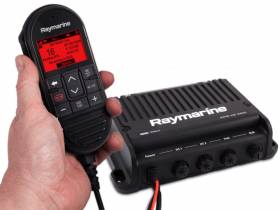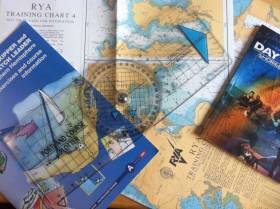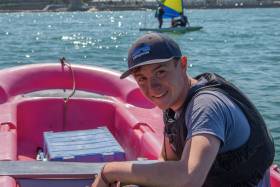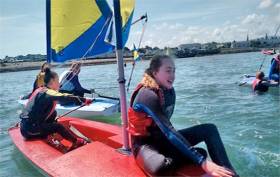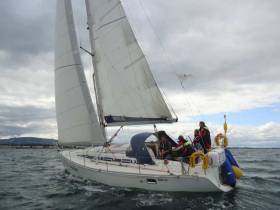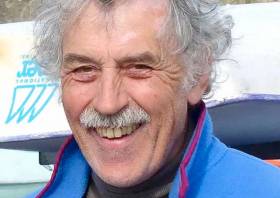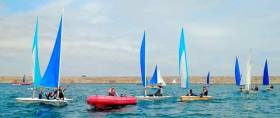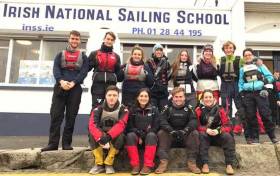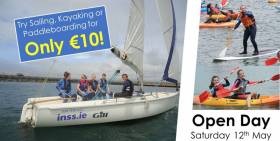Displaying items by tag: INSS
Last Places Open On Latest VHF Radio Course At INSS
#INSS - Anyone who wants to get certified in the use of short-range VHF marine radio should look to the Irish National Sailing & Powerboat School (INSS) in Dun Laoghaire, which is running its next course from Monday.
The four-evening course taking place next Monday 22, Tuesday 23, Thursday 25 and Friday 26 October (from 6.30pm to 9.30pm each session) will put you hands-on with a real VHF radio rather than a computer-based simulator.
The INSS promises that no more than two people will share a radio at any one stage of the course which, along with the complimentary set of course notes, will equip you to pass the short exam and leave as “a hugely competent user of VHF radio”.
Over the four evenings you will learn the NATO phonetic alphabet, how to conduct day-to-day communications and make emergency or distress calls, and the workings of the GMDSS network and system.
This course is also a prerequisite for many other practical courses, and is a legal requirement for anyone who plans to use a VHF radio set.
Places are still available for next week’s course but dates are also open in the new year in late January, February and March, as well as four other courses scheduled for 2019.
RS Series Gets Underway at INSS in Dun Laoghaire
The Irish National Sailing Club RS Super Series began on Saturday with racing open to all RS Sailing boats from Fevas, 200s, 400s and more.
As Afloat.ie reported earlier, racing takes place on Saturday mornings with a first gun just before 10 am on the following dates: November 17th, December 15th, January 19th, February 16th and March 23rd
The school is making its RS Feva fleet available for charter should there be a young crew eager to try out the boat and get racing.
Places Available On New Day Skipper Theory Course At INSS
#INSS - If you missed out on a spot in the Irish National Sailing & Powerboat School’s current RYA Day Skipper Theory course, not to worry — as the school has announced details of its next course which begins later this month.
The seven-session course at the INSS in Dun Laoghaire starts on Thursday October 25, with classes each Thursday (6.30pm-10.30pm; no class Thursday 1 November) and Saturday (10am-5pm) till Saturday 17 November.
All course notes and materials are included in the €499 course fee, with complementary tea/coffee and a hot cooked meal each Thursday evening class.
What’s In Store For The INSS Junior Club This Term?
#INSS - Over on the Irish National Sailing & Powerboat School website, Jeff Fahy gives the lowdown for what the 15-17 age group can expect as the INSS Junior Club resumes this weekend.
Dinghy and keelboat sailing will be the focus, with sailing out of the harbour as much as possible on RS Quests, Topaz Vibes and Laser Picos before more wintery weather prompts the move to 1720 Sportboats — on which youths will learn how to sail with asymmetric spinnakers.
Fahy reminds all students to bring their logbooks and keep them up to date, so that INSS instructors can determine what one needs to work on. The INSS website has more HERE.
INSS Junior Club Is Back For Autumn Term This Saturday
#INSS - Saturday sailing with the Irish National Sailing & Powerboat School’s Junior Club is back this coming Saturday 8 September.
Students from the summer courses and new sailors alike are invited to continue sailing throughout the school term.
The Junior Club is an excellent way to practice and improve upon the skills learnt during the summer months and it’s also a great way to keep in touch with the friends made during the summer courses.
The autumn term runs each Saturday from 8 September to 1 December. Sailing then resumes on 2 February and continues every Saturday (except 20 April) till 4 May.
Sailors can choose from two times to attend, either 10am to 1pm or 2pm to 5pm.
As with the summer courses, sailors are divided by age and then by experience, this ensures that they continue to be challenged and improve their sailing ability.
In the 7-10 age group, Optimist sailing will be a central part of the planned activities, as the sailors begin to progress we will start to introduce them to the Toppers, a larger and faster boat. Trips to feed the local family of seals as well as plenty of fun and games are also planned.
For those aged 11 to 14, the term is designed to keep participants’ skill levels up while introducing them to new boats like the Laser Pico or the RS Feva. Trips aboard the club’s 1720 Sportboat fleet are a key part of the calendar.
Sailors aged 15 and over will be introduced to the Topaz Magnos, Vibes and Laser Vago for spinnaker and trapeze training. The group will also spend time sailing squib keelboats and 1720 Sportboats.
In addition, the Junior Club is an excellent way to complete the Physical Recreation or Physical Skill sections of the Gaisce President’s Award.
The cost per term is €335, which includes the use of all INSS equipment and wetsuits, plus complimentary hot chocolate on the colder days. Book both terms at the same time for the reduced price of €619.
Taster sessions are also available for students that want to try out the club, at just €30.
New members are welcome to join the Junior Club at any time throughout the year; fees are calculated at a pro rata basis.
Bookings can be made online at the INSS website or over the phone at 01 284 4195.
Careers on the Water: Looking for an Active Retirement?
The Irish National Sailing & Powerboat School is continuing to expand careers in the marine leisure industry beyond the traditional school/college age cohort. Demand for training has shifted and no longer can sailing and powerboat training be considered an exclusive Summer pursuit. The INSS has never shied away from adapting to new challenges and have long since dispensed with the notion that the status quo is the only way to develop sailing and powerboating in Ireland.
The INSS recently launched an internship programme culminating in instructing qualifications for the forthcoming September to May period. Now they’re inviting experienced sailors and powerboaters who are either already retired or nearing retirement to consider undertaking training to become instructors in various disciplines and pass on their immense skills.
Sailors and Powerboaters Wanted
Training will be provided to candidates to get them to the level as follows:
- Powerboat Instructors
- Keelboat Instructors
- RYA Cruising Instructors (yachting courses)
The INSS is keen to hear from any prospective participants on this programme. The format of the programme will involve training to iron out any bad habits developed with an instructor course at the end. From then on, the new instructor would be invited to work on an ad-hoc basis on our busy Keelboat, Powerboat and Yacht Cruising Scheme courses.
Chief instructor Kenneth Rumball says he would be delighted to chat with prospective candidates, with an anticipated timeframe for the first round of training to run this Autumn, Winter and Spring with candidates qualifying in time for the busier Summer period.
Contact Kenneth:
Tel: 01 2844195
Email: [email protected]
Alistair Rumball Talks 40 Years Of Sail Schooling In Dun Laoghaire On RTÉ Radio 1’s Seascapes
#INSS - On the latest episode of RTÉ Radio 1’s Seascapes, Fergal Keane chats with Alistair Rumball, who is celebrating 40 years of his Irish National Sailing & Powerboat School in Dun Laoghaire Harbour.
Some 3,000 youngsters are expected to have passed through the INSS over this summer’s courses come September — a testament to the hard work Rumball and his family have put into the business since he filled the breach after the collapse of the old Dun Laoghaire Sailing School in 1978.
The INSS has seen some choppy waters over the decades, particularly during the recession period from 2010 when the phones stopped ringing and bookings dried up entirely for a time.
But the Rumballs were savvy enough to have put aside a ‘war chest’ to weather the storm, and redoubled their efforts to encourage children back onto the water by diversifying their offerings and creating their own demand, as Alistair puts it.
More lately, the INSS has branched out into certification for older sailors looking to make the most of their yachts — and then there’s Alistair's involvement in providing replica historical vessels for film and TV productions such as the hit series Vikings.
Dun Laoghaire Sailing School Invites Principals, Teachers & PTA Members to Information Events
The Irish National Sailing & Powerboat School (INSS) is inviting school principals, teachers, PTA members to two information sessions this week.
With the new physical education syllabus for the Leaving Certificate including sailing as an option the Irish National Sailing & Powerboat School is keen to welcome new participants to the sport.
Over the past 20 years the Irish National Sailing & Powerboat School has developed a Transition Year sailing programme that has been integrated into the school curriculum of over 25 Dublin second level schools. In addition to this structured programme, many schools are welcomed onto one-day taster programmes and are part of a key commitment of the school facilitate the increasing of participation in the sport.
Alongside the second level programmes, a thriving marine ecology programme and sailing activities has been developed by former primary school principal Muriel Rumball. Her programme has gone on be recognised by Science Foundation Ireland as part of the network of Discover Primary Science & Maths Centres. This programme is complimented by a developing after-school sailing programme with all the organisational aspects, from bus transfer to administration operated from the INSS’s office.
Muriel Rumball Introduces the DPSM Marine Ecology Programme
Primary Teachers and PTA Information Event
The school is holding a short information event for primary teachers and PTA members on Wednesday the 23rd of May from 4-5.30pm. The school’s instructors will bring you onto the water onboard their passenger RIBs and view two schools that hold afterschool lessons with the INSS. Back ashore, there’ll be a short information session over teas and coffees.
Secondary Teachers, Transition Year Co-Ordinators and PE Teachers
Second level teachers, TY coordinators and PE teachers invited to join us on Thursday the 24th of May for a short sailing session aboard our 1720 sportsyachts where you can experience sailing as your students would. The session will conclude with a short information session about the watersports tours, TY lessons and what can be done for the new Leaving Certificate PE Curriculum. The event will run from 5.30pm to 7.30pm.To register for either of these free information sessions drop an email [email protected].
The events will run from the school’s West Pier Base in Dun Laoghaire.
Irish National Sailing School Is Recruiting Instructors
The INSS is launching a major recruitment drive for sailing, powerboat and cruising instructors. The positions are both full time for the summer and ad-hoc during the week and at weekends. Thankfully, says School Principal Kenny Rumball, they've seen a major increase in demand for people wishing to get on the water to try sailing and powerboating, 'but now we need to grow the team to keep pace'
The INSS is making a particular call for applicants for Children’s Summer Sailing Course positions as well as Powerboat Instructors for weekend work. We would also be interested in hearing from college students who are available for weekday and weekend programmes during the remainder of this college term and the next.
There are a variety of other positions from maintenance to administration departments. Full details are in this link here
INSS Open Day Is Three Weeks Away
#INSS - Saturday 12 May is the date to save for the Irish National Sailing & Powerboat School’s open day for 2018.
All ages but especially children are welcome to try sailing, kayaking or paddleboarding from 10am to 5pm at the school’s Dun Laoghaire Harbour base for only €10.
And if you catch the sailing bug, the school has various courses for all abilities running in May and beyond.
For details on the open day, see the Facebook event page HERE.


























